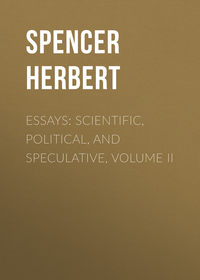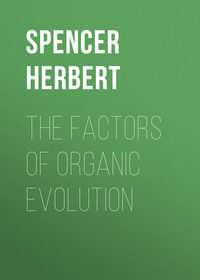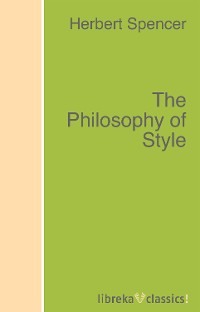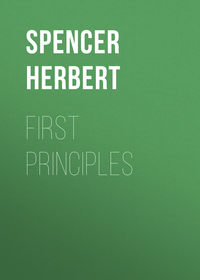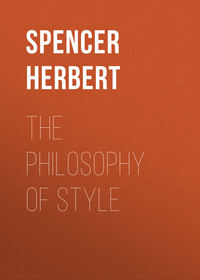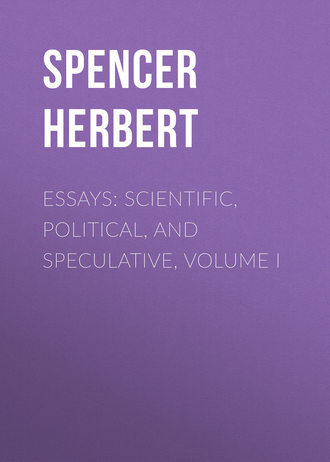 полная версия
полная версияEssays: Scientific, Political, and Speculative, Volume I
Thus the tacit assumption that there exists a break, is not simply gratuitous, but is negatived by the most obvious facts.
Certain of the words and phrases used in explaining that particular part of the Doctrine of Evolution which deals with the origin of species, are commented upon by Mr. Martineau as having implications justifying his view. Let us consider his comments.
He says that competition is not an "original power, which can of itself do anything;" further, that "it cannot act except in the presence of some possibility of a better or worse;" and that this "possibility of a better or worse" implies a "world pre-arranged for progress," "a directing Will intent upon the good." Had Mr. Martineau looked more closely into the matter, he would have found that, though the words and phrases he quotes are used for convenience, the conceptions they imply are not at all essential to the doctrine. Under its rigorously-scientific form, the doctrine is expressible in purely-physical terms, which neither imply competition nor imply better and worse.37
Beyond this indirect mistake there is a direct mistake. Mr. Martineau speaks of the "survivorship of the better," as though that were the statement of the law; and then adds that the alleged result cannot be inferred "except on the assumption that whatever is better is stronger too." But the words he here uses are his own words, not the words of those he opposes. The law is the survival of the fittest. Probably, in substituting "better" for "fittest," Mr. Martineau did not suppose that he was changing the meaning; though I dare say he perceived that the meaning of the word "fittest" did not suit his argument so well. Had he examined the facts, he would have found that the law is not the survival of the "better" or the "stronger," if we give to those words any thing like their ordinary meanings. It is the survival of those which are constitutionally fittest to thrive under the conditions in which they are placed; and very often that which, humanly speaking, is inferiority, causes the survival. Superiority, whether in size, strength, activity, or sagacity, is, other things equal, at the cost of diminished fertility; and where the life led by a species does not demand these higher attributes, the species profits by decrease of them, and accompanying increase of fertility. This is the reason why there occur so many cases of retrograde metamorphosis – this is the reason why parasites, internal and external, are so commonly degraded forms of higher types. Survival of the "better" does not cover these cases, though survival of the "fittest" does; and as I am responsible for the phrase, I suppose I am competent to say that the word "fittest" was chosen for this reason. When it is remembered that these cases outnumber all others – that there are more species of parasites than there are species of all other animals put together – it will be seen that the expression "survivorship of the better" is wholly inappropriate, and the argument Mr. Martineau bases upon it quite untenable. Indeed, if, in place of those adjustments of the human sense-organs, which he so eloquently describes as implying pre-arrangement, Mr. Martineau had described the countless elaborate appliances which enable parasites to torture animals immeasurably superior to them, and which, from his point of view, no less imply pre-arrangement, I think the notes of admiration which end his descriptions would not have seemed to him so appropriate.
One more word there is from the intrinsic meaning of which Mr. Martineau deduces what appears a powerful argument – the word Evolution itself. He says: —
"It means, to unfold from within; and it is taken from the history of the seed or embryo of living natures. And what is the seed but a casket of pre-arranged futurities, with its whole contents prospective, settled to be what they are by reference to ends still in the distance?"
Now, this criticism would have been very much to the point did the word Evolution truly express the process it names. If this process, as scientifically defined, really involved that conception which the word evolution was originally designed to convey, the implications would be those Mr. Martineau alleges. But, unfortunately for him, the word, having been in possession of the field before the process was understood, has been adopted merely because displacing it by another word seemed impracticable. And this adoption of it has been joined with a caution against misunderstandings arising from its unfitness. Here is a part of the caution: – "Evolution has other meanings, some of which are incongruous with, and some even directly opposed to, the meaning here given to it… The antithetical word, Involution, would much more truly express the nature of the process; and would, indeed, describe better the secondary characters of the process which we shall have to deal with presently."38 So that the meanings which the word involves, and which Mr. Martineau regards as fatal to the hypothesis, are already repudiated as not belonging to the hypothesis.
And now, having dealt with the essential objections raised by Mr. Martineau to the Hypothesis of Evolution as it is presented under that purely scientific form which generalizes the process of things, firstly as observed and secondly as inferred from certain ultimate principles, let me go on to examine that form of the Hypothesis which he propounds – Evolution as determined by Mind and Will – Evolution as pre-arranged by a Divine Actor. For Mr. Martineau apparently abandons the primitive theory of creation by "fiat of Almighty Will", and also the theory of creation by manufacture – by "a contriving and adapting power," and seems to believe in evolution: requiring only that "an originating Mind" shall be taken as its antecedent. Let us ask, first, in what relation Mr. Martineau conceives the "originating Mind" to stand to the evolving Universe. From some passages it is inferable that he considers the "presence of mind" to be everywhere needful. He says: —
"It is impossible to work the theory of Evolution upwards from the bottom. If all force is to be conceived as One, its type must be looked for in the highest and all-comprehending term; and Mind must be conceived as there, and as divesting itself of some speciality at each step of its descent to a lower stratum of law, till represented at the base under the guise of simple Dynamics."
This seems to be an unmistakable assertion that, wherever Evolution is going on, Mind is then and there behind it. At the close of the argument, however, a quite different conception is implied. Mr. Martineau says: —
"If the Divine Idea will not retire at the bidding of our speculative science, but retains its place, it is natural to ask, What is its relation to the series of so-called Forces in the world? But the question is too large and deep to be answered here. Let it suffice to say, that there need not be any overruling of these forces by the Will of God, so that the supernatural should disturb the natural; or any supplementing of them, so that He should fill up their deficiencies. Rather is His thought related to them as, in man, the mental force is related to all below it."
It would take too much space to deal fully with the various questions which this last passage raises. There is the question – Whence come these "Forces," spoken of as separate from the "Will of God" – did they pre-exist? Then what becomes of the Divine Power? Do they exist by the Divine Will? Then what kind of nature is that by which they act apart from the Divine Will? Again, there is the question – How do these deputy-forces co-operate in each particular phenomenon, if the presiding Will is not there present to control them? Either an organ which develops into fitness for its function, develops by the co-operation of these forces under the direction of Mind then present, or it so develops in the absence of Mind. If it develops in the absence of Mind, the hypothesis is given up; and if the "originating Mind" is required to be then and there present, we must suppose a particular providence to be present in each particular organ of each particular creature throughout the universe. Once more there is the question – If "His thought is related to them [these Forces] as, in Man, the mental force is related to all below it," how can "His thought" be regarded as the cause of Evolution? In man the mental force is related to the forces below it neither as a creator of them nor as a regulator of them, save in a very limited way: the greater part of the forces present in man, both structural and functional, defy the mental force absolutely. Nay, more, it needs but to injure a nerve to see that the power of the mental force over the physical forces is dependent on conditions which are themselves physical; and one who takes morphia in mistake for magnesia, discovers that the power of the physical forces over the mental is unconditioned by any thing mental.
Not dwelling on these questions, however, I will merely draw attention to the entire incongruity of this conception with the previous conception which I have quoted. Assuming that, when the choice is pressed on him, Mr. Martineau will choose the first, which alone has any thing like defensibility, let us go on to ask how far Evolution is made more comprehensible by postulating Mind, universally immanent, as its cause.
In metaphysical controversy, many of the propositions propounded and accepted as quite believable, are absolutely inconceivable. There is a perpetual confusing of actual ideas with what are nothing but pseud-ideas. No distinction is made between propositions that contain real thoughts, and propositions that are only the forms of thoughts. A thinkable proposition is one of which the two terms can be brought together in consciousness under the relation said to exist between them. But very often, when the subject of a proposition has been thought of as something known, and when the predicate has been thought of as something known, and when the relation alleged between them has been thought of as a known relation, it is supposed that the proposition itself has been thought. The thinking separately of the elements of a proposition is mistaken for the thinking of them in the combination which the proposition affirms. And hence it continually happens that propositions which cannot be rendered into thought at all, are supposed to be not only thought but believed. The proposition that Evolution is caused by Mind is one of this nature. The two terms are separately intelligible; but they can be regarded in the relation of effect and cause only so long as no attempt is made to put them together in this relation.
The only thing which any one knows as Mind is the series of his own states of consciousness; and if he thinks of any mind other than his own, he can think of it only in terms derived from his own. If I am asked to frame a notion of Mind divested of all those structural traits under which alone I am conscious of mind in myself, I cannot do it. I know nothing of thought save as carried on in ideas originally traceable to the effects wrought by objects and forces on me. A mental act is an unintelligible phrase if I am not to regard it as an act in which states of consciousness are severally known as like other states in the series that has gone by, and in which the relations between them are severally known as like past relations in the series. If, then, I have to conceive Evolution as caused by an "originating Mind," I must conceive this Mind as having attributes akin to those of the only mind I know, and without which I cannot conceive Mind at all.
I will not dwell on the many incongruities hence resulting, by asking how the "originating Mind" is to be thought of as having states produced by things objective to it; as discriminating among these states, and classing them as like and unlike; and as preferring one objective result to another. I will simply ask – What happens if we ascribe to the "originating Mind" the character absolutely essential to the conception of Mind, that it consists of a series of states of consciousness? Put a series of states of consciousness as cause, and the evolving Universe as effect, and then endeavor to see the last as flowing from the first. I find it possible to imagine in some dim way a series of states of consciousness serving as antecedent to any one of the movements I see going on; for my own states of consciousness are often indirectly the antecedents to such movements. But how if I attempt to think of such a series as antecedent to all actions throughout the Universe – to the motions of the multitudinous stars through space, to the revolutions of all their planets round them, to the gyrations of all these planets on their axes, to the infinitely-multiplied physical processes going on in each of these suns and planets? I cannot think of a single series of states of consciousness as causing even the relatively small group of actions going on over the Earth's surface. I cannot think of it even as antecedent to all the various winds and the dissolving clouds they bear, to the currents of all the rivers, and the grinding actions of all the glaciers; still less can I think of it as antecedent to the infinity of processes simultaneously going on in all the plants that cover the globe, from scattered polar lichens to crowded tropical palms, and in all the millions of quadrupeds that roam among them, and the millions of millions of insects that buzz about them. Even to a single small set of these multitudinous terrestrial changes, I cannot conceive as antecedent a single series of states of consciousness – cannot, for instance, think of it as causing the hundred thousand breakers that are at this instant curling over on the shores of England. How, then, is it possible for me to conceive an "originating Mind," which I must represent to myself as a single series of states of consciousness, working the infinitely-multiplied sets of changes simultaneously going on in worlds too numerous to count, dispersed throughout a space that baffles imagination?
If, to account for this infinitude of physical changes everywhere going on, "Mind must be conceived as there" "under the guise of simple Dynamics," then the reply is that, to be so conceived, Mind must be divested of all attributes by which it is distinguished; and that, when thus divested of its distinguishing attributes, the conception disappears – the word Mind stands for a blank. If Mr. Martineau takes refuge in the entirely different and, as it seems to me, incongruous hypothesis of something like a plurality of minds – if he accepts, as he seems to do, the doctrine that you cannot explain Evolution "unless among your primordial elements you scatter already the germs of Mind as well as the inferior elements" – if the insuperable difficulties I have just pointed out are to be met by assuming a local series of states of consciousness for each phenomenon, then we are obviously carried back to something like the alleged fetichistic notion, with the difference only, that the assumed spiritual agencies are indefinitely multiplied.
Clearly, therefore, the proposition that an "originating Mind" is the cause of Evolution, is a proposition that can be entertained so long only as no attempt is made to unite in thought its two terms in the alleged relation. That it should be accepted as a matter of faith, may be a defensible position, provided good cause is shown why it should be so accepted; but that it should be accepted as a matter of understanding– as a statement making the order of the universe comprehensible – is a quite indefensible position.
Here let me guard myself against a misinterpretation very likely to be put upon the foregoing arguments; especially by those who have read the Essay to which they reply. The statements of that Essay carry the implication that all who adhere to the hypothesis it combats, imagine they have solved the mystery of things when they have shown the processes of Evolution to be naturally caused. Mr. Martineau tacitly represents them as believing that, when every thing has been interpreted in terms of Matter and Motion, nothing remains to be explained. This, however, is by no means the fact. The Doctrine of Evolution, under its purely scientific form, does not involve Materialism, though its opponents persistently represent it as doing so. Indeed, among adherents of it who are friends of mine, there are those who speak of the Materialism of Buechner and his school, with a contempt certainly not less than that felt by Mr. Martineau. To show how anti-materialistic my own view is, I may, perhaps, without impropriety, quote some out of many passages which I have written on the question elsewhere:
"Hence though of the two it seems easier to translate so-called Matter into so-called Spirit, than to translate so-called Spirit into so-called Matter (which latter is, indeed, wholly impossible); yet no translation can carry us beyond our symbols."39
And again:
"See then our predicament. We can think of Matter only in terms of Mind. We can think of Mind only in terms of Matter. When we have pushed our explorations of the first to the uttermost limit, we are referred to the second for a final answer; and, when we have got the final answer of the second, we are referred back to the first for an interpretation of it. We find the value of x in terms of y; then we find the value of y in terms of x; and so on we may continue forever without coming nearer to a solution. The antithesis of subject and object, never to be transcended while consciousness lasts, renders impossible all knowledge of that Ultimate Reality in which subject and object are united."40
It is thus, I think, manifest that the difference between Mr. Martineau's view and the view he opposes is by no means so wide as he makes it appear; and further, it seems to me that such difference as exists is rather the reverse of that indicated by his exposition. Briefly expressed, the difference is that, where he thinks there is no mystery, the doctrine he combats recognizes a mystery. Speaking for myself only, I may say that, agreeing entirely with Mr. Martineau in repudiating the materialistic interpretation as utterly futile, I differ from him simply in this, that while he says he has found another interpretation, I confess that I cannot find any interpretation; while he holds that he can understand the Power which is manifested in things, I feel obliged to admit, after many failures, that I cannot understand it. So that, in presence of the transcendent problem which the universe presents, Mr. Martineau regards the human intellect as capable, and I as incapable. This contrast does not appear to me of the kind which his Essay tacitly asserts. If there is such a thing as the "pride of Science," it is obviously exceeded by the pride of Theology. I fail to perceive humility in the belief that the human mind is able to comprehend that which is behind appearances; and I do not see how piety is especially exemplified in the assertion that the Universe contains no mode of existence higher in Nature than that which is present to us in consciousness. On the contrary, I think it quite a defensible proposition that humility is better shown by a confession of incompetence to grasp in thought the Cause of all things; and that the religious sentiment may find its highest sphere in the belief that the Ultimate Power is no more representable in terms of human consciousness than human consciousness is representable in terms of a plant's functions.
THE FACTORS OF ORGANIC EVOLUTION
[First published in The Nineteenth Century, for April and May, 1886.]
I
Within the recollection of men now in middle life, opinion concerning the derivation of animals and plants was in a chaotic state. Among the unthinking there was tacit belief in creation by miracle, which formed an essential part of the creed of Christendom; and among the thinking there were two parties, each of which held an indefensible hypothesis. Immensely the larger of these parties, including nearly all whose scientific culture gave weight to their judgments, though not accepting literally the theologically-orthodox doctrine, made a compromise between that doctrine and the doctrines which geologists had established; while opposed to them were some, mostly having no authority in science, who held a doctrine which was heterodox both theologically and scientifically. Professor Huxley, in his lecture on "The Coming of Age of the Origin of Species," remarks concerning the first of these parties as follows: —
"One-and-twenty years ago, in spite of the work commenced by Hutton and continued with rare skill and patience by Lyell, the dominant view of the past history of the earth was catastrophic. Great and sudden physical revolutions, wholesale creations and extinctions of living beings, were the ordinary machinery of the geological epic brought into fashion by the misapplied genius of Cuvier. It was gravely maintained and taught that the end of every geological epoch was signalised by a cataclysm, by which every living being on the globe was swept away, to be replaced by a brand-new creation when the world returned to quiescence. A scheme of nature which appeared to be modelled on the likeness of a succession of rubbers of whist, at the end of each of which the players upset the table and called for a new pack, did not seem to shock anybody.
I may be wrong, but I doubt if, at the present time, there is a single responsible representative of these opinions left. The progress of scientific geology has elevated the fundament principle of uniformitarianism, that the explanation of the past is to be sought in the study of the present, into the position of an axiom; and the wild speculations of the catastrophists, to which we all listened with respect a quarter of a century ago, would hardly find a single patient hearer at the present day."
Of the party above referred to as not satisfied with this conception described by Professor Huxley, there were two classes. The great majority were admirers of the Vestiges of the Natural History of Creation– a work which, while it sought to show that organic evolution has taken place, contended that the cause of organic evolution, is "an impulse" supernaturally "imparted to the forms of life, advancing them, … through grades of organization." Being nearly all very inadequately acquainted with the facts, those who accepted the view set forth in the Vestiges were ridiculed by the well-instructed for being satisfied with evidence, much of which was either invalid or easily cancelled by counter-evidence, and at the same time they exposed themselves to the ridicule of the more philosophical for being content with a supposed explanation which was in reality no explanation: the alleged "impulse" to advance giving us no more help in understanding the facts than does Nature's alleged "abhorrence of a vacuum" help us to understand the ascent of water in a pump. The remnant, forming the second of these classes, was very small. While rejecting this mere verbal solution, which both Dr. Erasmus Darwin and Lamarck had shadowed forth in other language, there were some few who, rejecting also the hypothesis indicated by both Dr. Darwin and Lamarck, that the promptings of desires or wants produced growths of the parts subserving them, accepted the single vera causa assigned by these writers – the modification of structures resulting from modification of functions. They recognized as the sole process in organic development, the adaptation of parts and powers consequent on the effects of use and disuse – that continual moulding and re-moulding of organisms to suit their circumstances, which is brought about by direct converse with such circumstances.
But while this cause accepted by these few is a true cause, since unquestionably during the life of the individual organism changes of function produce changes of structure; and while it is a tenable hypothesis that changes of structure so produced are inheritable; yet it was manifest to those not prepossessed, that this cause cannot with reason be assigned for the greater part of the facts. Though in plants there are some characters which may not irrationally be ascribed to the direct effects of modified functions consequent on modified circumstances, yet the majority of the traits presented by plants are not to be thus explained. It is impossible that the thorns by which a briar is in large measure defended against browsing animals, can have been developed and moulded by the continuous exercise of their protective actions; for in the first place, the great majority of the thorns are never touched at all, and, in the second place, we have no ground whatever for supposing that those which are touched are thereby made to grow, and to take those shapes which render them efficient. Plants which are rendered uneatable by the thick woolly coatings of their leaves, cannot have had these coatings produced by any process of reaction against the action of enemies; for there is no imaginable reason why, if one part of a plant is eaten, the rest should thereafter begin to develop the hairs on its surface. By what direct effect of function on structure, can the shell of a nut have been evolved? Or how can those seeds which contain essential oils, rendering them unpalatable to birds, have been made to secrete such essential oils by these actions of birds which they restrain? Or how can the delicate plumes borne by some seeds, and giving the wind power to waft them to new stations, be due to any immediate influences of surrounding conditions? Clearly in these and in countless other cases, change of structure cannot have been directly caused by change of function. So is it with animals to a large extent, if not to the same extent. Though we have proof that by rough usage the dermal layer may be so excited as to produce a greatly thickened epidermal layer, sometimes quite horny; and though it is a feasible hypothesis that an effect of this kind persistently produced may be inherited; yet no such cause can explain the carapace of the turtle, the armour of the armadillo, or the imbricated covering of the manis. The skins of these animals are no more exposed to habitual hard usage than are those of animals covered by hair. The strange excrescences which distinguish the heads of the hornbills, cannot possibly have arisen from any reaction against the action of surrounding forces; for even were they clearly protective, there is no reason to suppose that the heads of these birds need protection more than the heads of other birds. If, led by the evidence that in animals the amount of covering is in some cases affected by the degree of exposure, it were admitted as imaginable that the development of feathers from preceding dermal growths had resulted from that extra nutrition caused by extra superficial circulation, we should still be without explanation of the structure of a feather. Nor should we have any clue to the specialities of feathers – the crests of various birds, the tails sometimes so enormous, the curiously placed plumes of the bird of paradise, &c., &c. Still more obviously impossible is it to explain as due to use or disuse the colours of animals. No direct adaptation to function could have produced the blue protuberances on a mandril's face, or the striped hide of a tiger, or the gorgeous plumage of a kingfisher, or the eyes in a peacock's tail, or the multitudinous patterns of insects' wings. One single case, that of a deer's horns, might alone have sufficed to show how insufficient was the assigned cause. During their growth, a deer's horns are not used at all; and when, having been cleared of the dead skin and dried-up blood-vessels covering them, they are ready for use, they are nerveless and non-vascular, and hence are incapable of undergoing any changes of structure consequent on changes of function.


